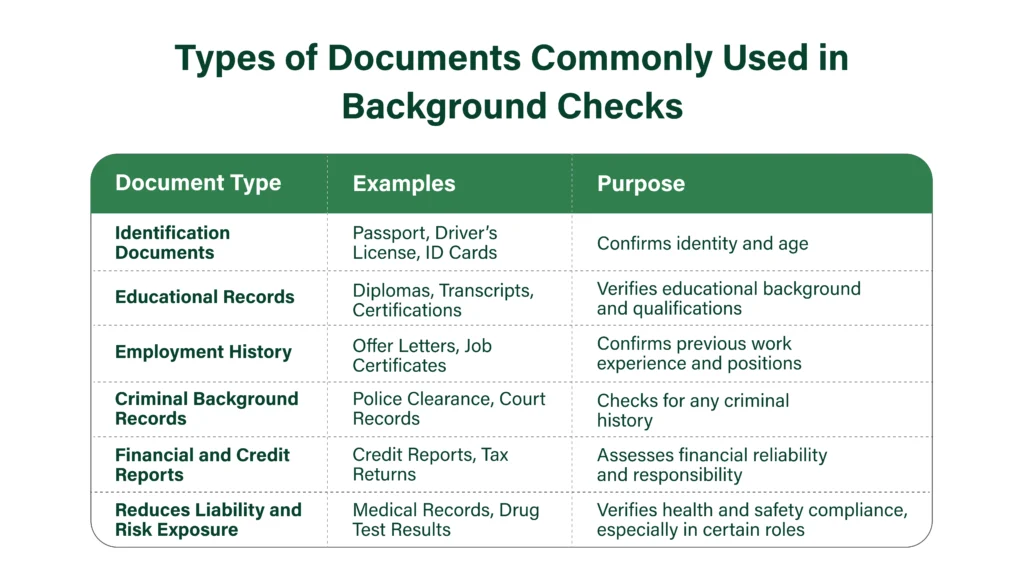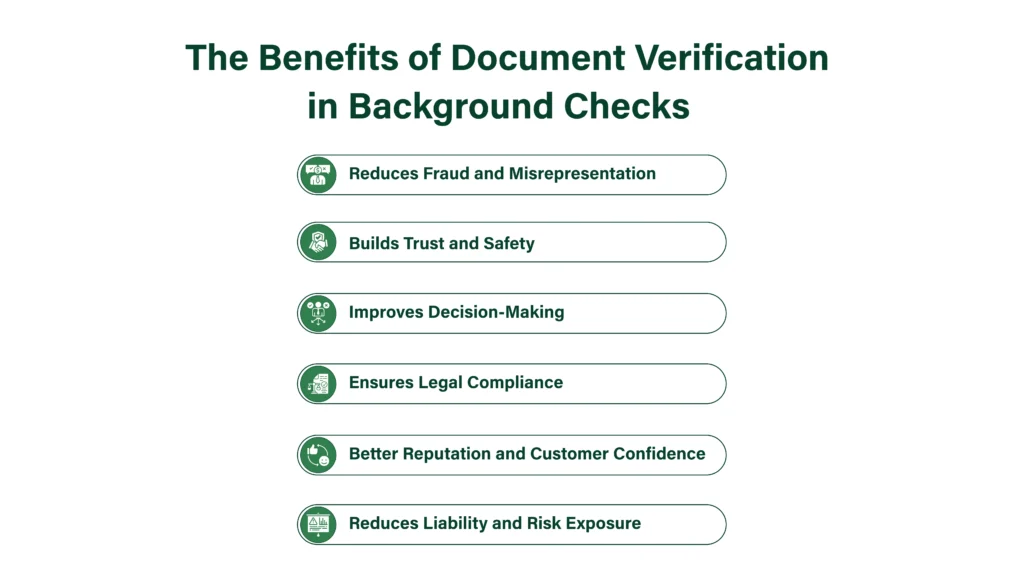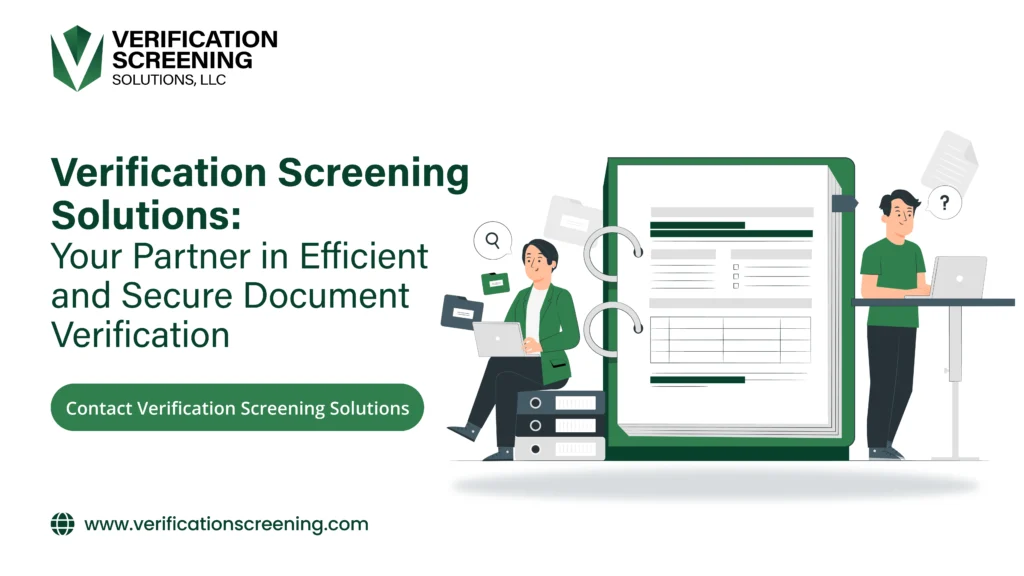With rising competition in the job market, many candidates feel pressured to make their resumes stand out—sometimes by stretching the truth. Recent trends indicate a 19% increase in Google searches for advice on resume falsification at the end of 2023 compared to the previous year, 2022. This increase in job market pressures signals how important it has become for employers to verify candidate claims accurately and thoroughly.
Having the right documents in order can make all the difference when hiring, screening tenants, or verifying someone’s credentials. Employers and property managers rely on these background checks to make smart, informed choices.
Why Are Documents Important in Background Screening?
Background screening enables businesses, landlords, and organizations to make informed decisions about who they hire or allow into their spaces. Essential documents such as IDs, diplomas, and certificates are crucial to this process, as they verify an individual’s identity, background, and qualifications. Here’s why these documents are fundamental:
1. Trustworthy Proof
Documents provide solid, trustworthy proof. A diploma shows someone completed a degree, while an ID verifies their real identity. Unlike self-reported details that can sometimes be stretched or exaggerated, official documents give facts that are easy to check.
2. Accuracy and Consistency
Documents give reliable information, reducing the chance of errors. Employers or landlords can trust that what’s on paper aligns with reality. This accuracy helps avoid misunderstandings and leads to smoother decision-making, whether it’s about hiring, renting, or partnering.
3. Staying Within Legal Guidelines
Using documents also keeps organizations within legal boundaries. Many industries have rules about hiring, privacy, and data use. Document checks help companies follow regulations like the Fair Credit Reporting Act (FCRA) in the U.S. This protects companies from penalties and gives people confidence that their information is handled properly.
4. Making Decisions Faster
With the right documents, decisions can be made more quickly. When critical facts are in order, there’s no need for as many follow-ups or additional checks. This efficiency is especially valuable when many hires or approvals are involved, helping organizations move forward confidently.
Types of Documents Commonly Used in Background Checks

Every document has a purpose in the background check. Here are some of the most common documents used in background checks.
1. Identification Documents
These documents confirm basic details like name, age, and nationality. An official ID helps ensure the individual is genuinely who they claim to be, reducing the risk of identity theft or impersonation. This step is essential in high-security roles or industries where accurate identification is critical.
Common Documents Required Include:
- US passport
- Permanent Resident Card
- Social security card
2. Educational Records
Educational records provide proof of a person’s academic achievements and specialized training. These records confirm that the candidate has the necessary background for roles requiring specific expertise or qualifications.
Whether it’s a diploma for a teaching job or a certification for a specialized skill, these documents support claims of knowledge and capability, making them crucial in fields like healthcare, engineering, and IT.
Documents Required for check:
- Marksheet of the final year of the degree
- Provisional/Consolidated/Degree certificate
- Diploma certificate (if applicable)
3. Employment History and References
Employment history documents verify previous job titles, responsibilities, and tenure. They help employers see whether a candidate’s experience aligns with the role’s requirements. Employment history verification also provides insight into the individual’s professional behavior, as past roles and references offer clues about reliability and performance.
Documents Required:
- The current company’s offer letter
- The current company’s last three salary slips
- Previous company’s offer letter, salary slips, and experience letter
4. Criminal Background Records
Criminal background records are essential for verifying any history of criminal activity. Employers, landlords, and financial institutions often review these records to assess potential risk.
For instance, a police clearance certificate is typically required for jobs involving vulnerable populations (e.g., healthcare, education) to ensure the candidate’s record is clean. These records help organizations make safe and responsible decisions by providing insight into legal history.
Common Documents Required:
- Identity card stating your full name, date of birth, father’s name, and address
- Police clearance certificate
5. Financial and Credit Reports
Financial documents required for background screening reveal an individual’s fiscal responsibility in positions requiring financial trust, such as banking or management. Credit reports, for example, provide a history of financial behavior, showing whether someone reliably manages debts and obligations. This is often a significant factor in hiring decisions that involve handling money or sensitive financial data.
6. Health and Safety Clearances
Some industries, like construction, healthcare, and public safety, require a baseline health and safety compliance level. Medical records, drug tests, and fitness clearances confirm that an individual meets specific roles’ physical and mental requirements.
For jobs involving physical risk, these documents ensure that candidates are fit to perform job functions safely, protecting both the individual and those around them.
The Benefits of Document Verification in Background Checks

Document verification is a powerful process that brings accuracy, safety, and trust to the background screening process. Here’s how it benefits organizations and individuals:
1. Reduces Fraud and Misrepresentation
Document verification helps prevent false information from slipping through. It validates primary details like job titles, qualifications, and identities, reducing the risk of fraudulent claims.
For instance, verifying an employment history document from a reputable source can confirm the duration and role of a candidate’s previous job, ensuring they truly have the experience they claim
2. Builds Trust and Safety
When an organization confirms a person’s background, it reassures employees, clients, and partners that the people they work with meet high standards. This is critical in industries such as education and healthcare, where safety and accountability directly impact the well-being of others.
3. Improves Decision-Making
With verified documents, companies don’t need to second-guess background details, allowing them to focus more on the person’s skills and fit for the role. This process is particularly beneficial when hiring in large volumes, as it reduces turnaround time without sacrificing accuracy.
4. Ensures Legal Compliance
Document verification plays a crucial role in ensuring that background checks are conducted in compliance with various legal standards, particularly those outlined in the Fair Credit Reporting Act (FCRA) and similar regulations. These laws set strict guidelines for how personal data should be collected, used, and protected during the background screening process. For example, the FCRA mandates that employers must obtain written consent from candidates before conducting background checks and provides candidates the right to dispute any inaccuracies in their reports.
5. Better Reputation and Customer Confidence
When an organization consistently uses document verification, it is committed to high standards and integrity, enhancing its reputation. Companies known for rigorous screening procedures build greater customer confidence, as clients know they deal with trustworthy, well-vetted individuals. This is especially important for organizations in sensitive areas like financial services, education, or care facilities, where customer trust is essential.
6. Reduces Liability and Risk Exposure
Document verification protects companies from the risks of hiring or partnering with individuals with undisclosed issues. For instance, not checking a candidate’s financial background could expose a company to liability if misconduct occurs in a financial role.
Document verification minimizes these risks by ensuring that every candidate meets specific standards, protecting the organization from unexpected legal or operational challenges.
Challenges and Considerations in Document Verification
While document verification strengthens the background screening process, it also presents challenges and important considerations. Here’s a look at some of the most significant ones:
1. Document Forgery and Counterfeiting
One of the biggest challenges in document verification is identifying fake or forged documents. With advancements in technology, it’s become more accessible to create counterfeit records that look highly convincing. For example, fake diplomas or government IDs can sometimes bypass conventional verification methods, posing a serious risk to organizations.
To address this, many companies are investing in advanced verification tools, such as AI-based analysis, digital watermarking, and secure QR codes. However, these solutions can be costly and may require specialized training. You can seek help from background screening companies that can accommodate your screening needs within your budget.
2. Privacy and Data Security Concerns
Handling sensitive personal information, like IDs and criminal background records, requires strict privacy and data security measures. Organizations must ensure compliance with privacy laws, such as the GDPR in Europe and the FCRA in the U.S., which regulate how personal data is collected, stored, and used. Mishandling data or failing to protect it from unauthorized access can lead to legal penalties and damage to reputation.
As a result, companies need to implement secure data storage and processing systems and may require additional staff training to ensure compliance.
3. Verification of Document Authenticity
Ensuring the authenticity of documents can be challenging, especially for organizations without access to advanced verification systems. Checking the legitimacy of diplomas, certifications, or employment records may require contacting issuing institutions, which can be time-consuming and inconsistent.
Many companies use third-party verification services to ease this burden, which introduces an added cost and may limit control over the verification process. Additionally, some records may not be publicly accessible due to privacy laws or institution policies, complicating the verification further.
4. Costs of Advanced Verification Solutions
The background check cost of investing in high-quality verification tools, such as digital authentication software or third-party verification services, can be high. Small and medium-sized companies may find these expenses prohibitive, making it challenging to conduct thorough document checks. Budget constraints can also limit the level of scrutiny that an organization can apply to each document, potentially increasing the risk of overlooking false or altered records.
Balancing costs with the need for accurate verification is a challenge that requires careful planning and resource allocation.
5. Keeping Up with Evolving Regulations
Running background checks and document verification are subject to various legal requirements that vary by region and industry. Failure to keep current with these regulations can expose a company to penalties and lawsuits. Regular training, legal consultations, and compliance audits are essential but require time and resources to manage effectively. A professional background check company can help you with this.
Verification Screening Solutions: Your Partner in Efficient and Secure Document Verification
Verification Screening Solutions offers a comprehensive suite of services to streamline and strengthen the document verification process. Our platform is built to address the challenges organizations face when checking documents’ authenticity.
Here’s how we can help:
- County Level Criminal Search
- Statewide Criminal Search
- Federal Criminal Search
- Multi-State Criminal Search
- Motor Vehicle Report (MVR)
- Sex Offender Search
- Federal Civil Search
- County Level Civil Search
- SSN Trace
- Employment Verification
- Education Verification
- Fingerprinting
Partner with Verification Screening Solutions Today for Fast and Secure Document Verification!
With Verification Screening Solutions, you can easily ensure your background checks’ accuracy, security, and compliance. Our advanced technology, customizable services, and expert support help you make informed decisions while reducing the risk of fraud and legal exposure.
Take the first step toward more reliable and efficient background screening today.


